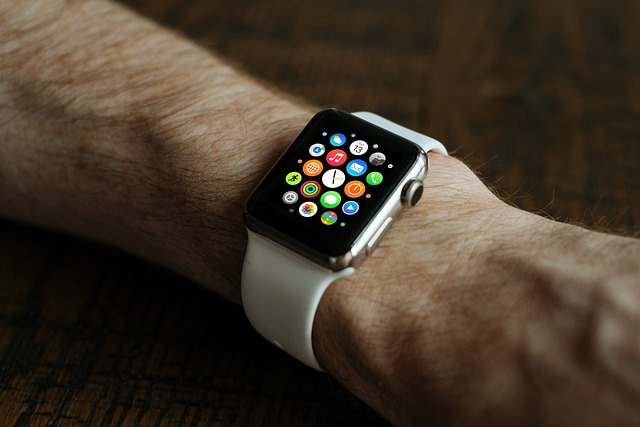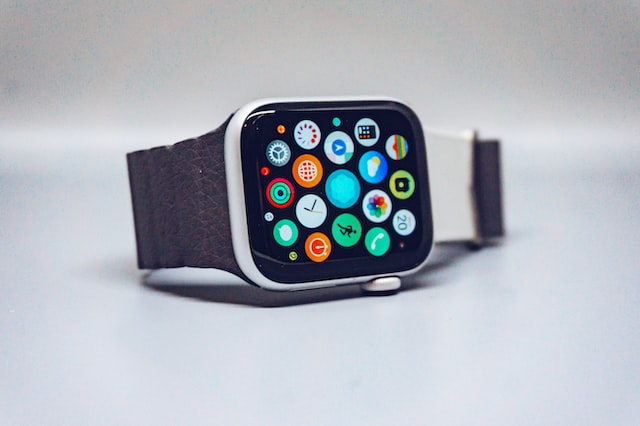A Fitbit tracker is a device that primarily tracks activity, such as steps taken and calories burned, while a smartwatch is a device that combines the features of a traditional watch with advanced technology, such as the ability to make phone calls, send texts, and run apps.
Smartwatch also have more advanced sensors and tracking capabilities, such as GPS, heart rate monitoring and sleep tracking, which are not typically found in a Fitbit Tracker.
What is a Fitbit tracker?
(Image by FitNishMedia from Pixabay )
![]()
A Fitbit tracker is a fitness and health device that uses sensors to track activity, steps taken, heart rate, and sleep. Fitbit also has apps for users to manage their data and connect with others who are using Fitbit trackers.
What is a smartwatch?
(Image by fancycrave1 from Pixabay )

A smartwatch is a wearable device that allows you to access information and interact with your surroundings through a touchscreen or physical buttons. They come in a variety of forms, including fitness trackers and watches. Fitness trackers are designed to help you keep track of your activity and progress, while watches are more versatile and can be used for tasks like checking the time, weather conditions, and messages.
Which One is Right for You?
Fitbit trackers generally have a lower price point, making them more affordable if you’re just looking for a basic fitness tracker. They also don’t offer as many features or capabilities as smartwatches, which may be something you want if you only plan on using it for tracking your physical activity and monitoring your overall health.
On the other hand, smartwatches are more versatile and offer more features than typical fitness trackers. For example, many smartwatches have sensors that can detect heart rate and blood pressure, which can help you stay aware of your health conditions and make better health decisions. Additionally, many smartwatches have screens that are larger than those on Fitbit trackers, so they can act as full-fledged smartphones replacement devices. This means that they can display notifications from your phone, let you access apps directly from the watch face, and more. If all of this sounds like what you need in a wearable device, then a smartwatch may be the right choice for you.
What is the main purpose of a smartwatch?
The main purpose of a smartwatch is to connect to a smartphone and provide access to various features and functions, such as notifications, fitness tracking, and mobile payments, without the need to take out the phone. Smartwatches can also provide an easy way to control your phone’s music, camera and other apps from the wrist. Additionally, smartwatches usually have a variety of sensors including GPS, heart rate monitor, accelerometer and even ECG that allow for a more advanced fitness and health tracking. Some smartwatches also have built-in cellular connectivity, which allows them to make and receive calls and send text messages independently of a smartphone. Smartwatches are designed to be a convenient, always-on extension of your smartphone, making it easy to stay connected and informed throughout the day.
Can smartwatch work without phone?
Yes, many smartwatches can work independently of a smartphone, but their functionality will be limited compared to when they are connected to a phone. Smartwatches that have built-in cellular connectivity can make and receive calls, send text messages and access the internet without the need to connect to a smartphone. They can also access a limited amount of apps and features that don’t rely on an internet connection. However, many of the smartwatch’s features like receiving notifications, music control, GPS tracking, and access to a wide range of apps, require a connection to a smartphone via Bluetooth or Wi-Fi. Additionally, without a phone, a smartwatch will not be able to access cellular data and will only be able to access to the internet through wifi connections.
Can you use a Fitbit with any phone?
Fitbit devices can be used with most smartphones, as long as the phone is compatible with the Fitbit app, which is available for both iOS and Android devices.
However, some specific features such as mobile payments and music control may only be available for certain phone models and operating systems. Additionally, to receive call, text, and app notifications on your Fitbit device, your phone must be nearby and connected to the internet via Bluetooth.
The latest Fitbit devices are compatible with the new operating systems but they may have limitations. For example, if you’re using an iOS device, you may need to make sure that your iPhone meets the minimum requirements for the Fitbit device you have, or if you’re using an Android device, your phone should be running on a compatible version of the Android operating system.
Can Fitbit watch make calls?
Some Fitbit devices, such as the Fitbit Versa and Ionic, have built-in cellular connectivity, which allows them to make phone calls and send text messages directly from the watch without needing to be connected to a smartphone. However, not all Fitbit models have this feature.
For models without built-in cellular connectivity, you will need to have your smartphone nearby and connected to the internet via Bluetooth, in order to make and receive calls and texts. The notifications for calls and texts will be received on the watch, but the call or text will be made or replied through the paired phone.
What is the best Fitbit watch to buy?
The best Fitbit watch to buy depends on your specific needs and preferences. Here are a few of the most popular Fitbit models and their key features to consider:
- Fitbit Sense: This is the most advanced smartwatch from Fitbit, it has ECG, EDA sensor, skin temperature sensor and advanced sleep tracking. This watch is great for those looking for a health-focused smartwatch with a wide range of features.
- Fitbit Versa 3: This is a great option for those looking for a balance of fitness and smart features. It has GPS, heart rate monitoring, and the ability to control music and access apps, as well as a 6+ days of battery life.
- Fitbit Inspire 2: This is a budget-friendly option for those looking for basic fitness tracking features such as step counting, sleep tracking, and activity tracking. It also has a long battery life of up to 10 days.
- Fitbit Charge 4: This is a fitness tracker that has GPS, heart rate monitoring, and the ability to control music and access apps. It’s great for those who want a more affordable option but still want GPS and advanced tracking features.
Ultimately, the best Fitbit watch for you will depend on your specific needs and preferences, so it’s important to research and compare the features of different models before making a purchase.
Which is the best smart watch to buy?
The best smartwatch to buy depends on your specific needs and preferences, as well as the operating system of your smartphone. Here are a few of the most popular smartwatch options and their key features to consider:
- Apple Watch Series 6: This is the latest smartwatch from Apple and it’s a great option for those who have an iPhone, it has a wide range of features including ECG, Blood oxygen sensor, fall detection, and advanced fitness tracking capabilities. It also has a sleek design, a bright and vibrant display, and a variety of customizable watch faces and bands.
- Samsung Galaxy Watch 3: This is a great option for those who have a Samsung phone or Android device. It has advanced fitness and health tracking features, including GPS, heart rate monitoring, and ECG. It also has a stylish and premium design, and a long battery life.
- Google Pixel Watch: This is a new and advanced smartwatch from Google, it has a new operating system called “WearOS” and it’s compatible with both Android and iOS devices. It has a sleek design, advanced fitness and health tracking features, and a long battery life.
- Fitbit Sense: This is a new and advanced smartwatch from Fitbit, it has ECG, EDA sensor, skin temperature sensor and advanced sleep tracking. This watch is great for those looking for a health-focused smartwatch with a wide range of features.
Ultimately, the best smartwatch for you will depend on your specific needs and preferences, so it’s important to research and compare the features of different models before making a purchase.
What are the disadvantages of Fitbit?
- Limited battery life: While Fitbit devices have improved battery life in recent years, they still need to be charged frequently, which can be inconvenient for some users.
- Limited smartwatch features: While Fitbit devices have some smartwatch features, they are not as feature-rich as other smartwatches on the market.
- Limited app support: The app selection available for Fitbit devices is limited compared to other smartwatches and may not have all the apps that some users are looking for.
- Limited compatibility: Fitbit devices are not compatible with all smartphones and can only be used with specific operating systems.
- Limited Functionality : Some of the features of the Fitbit may not work as expected or may not be accurate all the time, like GPS tracking, heart rate monitoring, which may not be as accurate as other dedicated devices for those specific features.
- Price: Some of the latest models of Fitbit watches can be quite expensive and may not be affordable for everyone.
What are the advantages of a smartwatch?
- Convenience: Smartwatches allow users to access important information and perform various tasks without having to take out their phone. This can include receiving notifications, controlling music, and making phone calls.
- Fitness tracking: Many smartwatches include fitness tracking features such as step counting, heart rate monitoring, and GPS tracking. This can help users stay on top of their fitness goals and track their progress.
- Smart Features: Smartwatches can have a variety of smart features such as voice assistance, mobile payments, and GPS navigation.
- Customization: Many smartwatches are customizable with different watch faces, bands, and widgets to personalize the watch to the user’s liking.
- Connectivity: Smartwatches can connect to other devices such as smartphones, tablets, laptops, and even smart home devices for a seamless experience.
- Security: Some smartwatches can have features like face recognition, fingerprint scanner and passcode, which can make the device more secure.
- Entertainment: Some smartwatches have features like music and podcast player, youtube, netflix and many more, which can entertain the user.
Can Fitbit monitor heart problems?
Some Fitbit devices have the capability to monitor heart rate and can provide information about heart rate patterns over time. However, Fitbit devices are not medical devices and the data they provide should not be used to diagnose or treat any heart problems. The heart rate monitoring feature on Fitbit is intended for general wellness and fitness tracking purposes.
Fitbit does have some devices that have been FDA cleared for certain use cases such as ECG monitoring, but it’s important to note that these features are not intended to diagnose, treat, or cure any disease or medical condition, and it’s always important to consult a doctor to get a proper diagnosis.
It’s also important to note that Fitbit devices may not be as accurate as dedicated medical devices, so if you have any concerns about your heart health, it’s always best to consult with a doctor.
Can Fitbit tell if you’re stressed?
Some Fitbit devices have the capability to track and monitor stress levels through the use of heart rate variability (HRV) sensors. HRV is the time between heartbeats, and changes in HRV can indicate changes in stress levels.
Fitbit Sense, Fitbit Versa 3 and Fitbit Ionic have a feature called “Stress Management” that uses HRV data to provide a daily stress score, which ranges from 1 to 100. A higher score indicates higher stress levels, and a lower score indicates lower stress levels. The feature also includes guided breathing exercises to help users manage their stress.
It’s important to note that these stress scores are not meant to be used for medical diagnosis or treatment, and should not replace the advice of a healthcare professional. Fitbit devices also use different algorithms to calculate stress levels and the accuracy might vary.
Additionally, there are many other factors that can affect stress levels, and the HRV data provided by Fitbit should be considered in the context of other information, such as self-reported symptoms and overall health. If you have any concerns about your stress levels, it’s always best to consult with a doctor.
Featured Image By – Photo by Simon Daoudi on Unsplash









